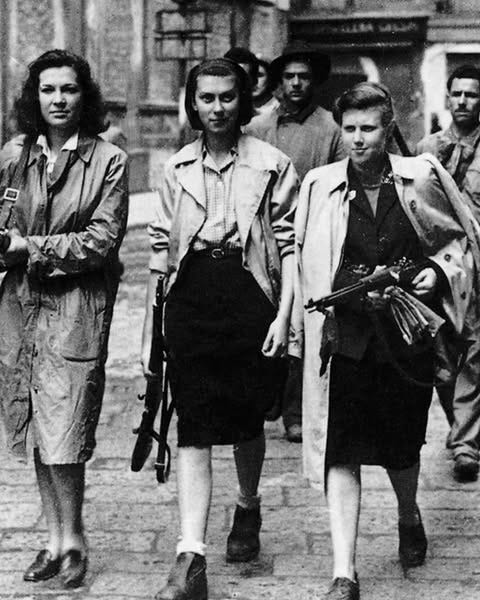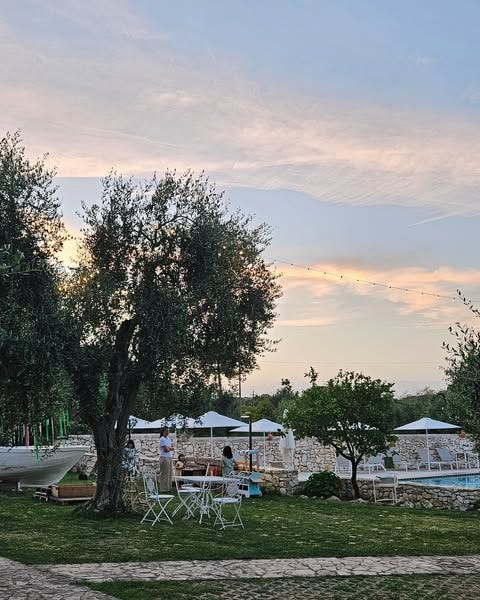April 25 is a national holiday in Italy — Liberation Day — which this year celebrates 80 years of freedom from Nazi-fascism, including 20 years of fascism and 5 years of war.
It was unfortunately down-played this year by using the funeral of the Pope as an excuse but it’s a commemorative day to remember the resilience and the sacrifices that ordinary people, partisans (partigiani) and citizens, made for the democracy and freedom for all of Italy, for generations of Italians since the Second World War ended. I posted about this on Instagram on Friday and got so many comments from people saying, “thank you, I didn’t know about this,” and I have a suspicion that most visitors to Italy don’t know much about the country’s struggle with fascism between the two world wars, and that even many Italians don’t even really think about the fact that they get to live the way they do thanks to the many brave people that fought with (and gave up) their lives for the freedom we enjoy today.
It’s hard to imagine today when you see picturesque Italian towns, but just looking at photographs of my town of San Miniato and its surrounds, with buildings that were mined (mines were often left as booby traps), leaving them in rubble. Thousands of civilians lost their lives. Tuscany was particularly hard hit; in just the months between April and August of 1944, there were 280 Nazi massacres here alone, resulting in the murders of 4500 civilians.
I read a post that spelled it out quite clearly, non sono nato in un paese libero, sono nato in paese liberato, “I wasn’t born in a free country. I was born in a freed country.”
It's an important holiday to commemorate, to never forget the incredible sacrifices that were made so that we could live and visit freely today in this very beautiful, historically and culturally rich, delicious place.
I know this may seem like it doesn’t have much to do about food, but believe me, it has a lot to do with food. War and the oppression of living under a dictatorship for two decades had a profound effect on the food system, on food insecurity, even on the inventive ways women fed their families in Italy.
I’ve written about this in the past but some people have asked me to share again, so here are some of the inspiring stories of Italians who resisted fascism.
One is Francesca Rolla (below), a partisan from Carrara in Tuscany’s northwest, refused to surrender her town to the Fascists and armed with nothing but pure grit, she led the other women to do the same. It was 7 July 1944, in the Tuscan town of Carrara (where the marble is from) at the gateway to the Tuscan Apuane alps. The city was occupied by Nazis. Carrara's 100,000 citizens (mostly women, children and elderly, plus many people who had left other towns) had been ordered to evacuate the town so the Nazis could have full military control of the strategic spot.
At 11am, the women of Carrara went door to door, getting people out on the street to protest in front of the German commander. In Piazza delle Erbe, where the daily market takes place, the women, unarmed, upheaved the stalls and closed all the shops, declaring they would not abandon their town. Facing the soldiers armed with machine guns, the women shouted, sang, lay on the ground, hurled themselves at the enemy soldiers.
In an interview as an elderly woman, Rolla described:
"We in the front line knew that if we showed our fear it would have all been useless and the women behind us would run away. So we became brave and with with our bear hands we became like beasts to scare the soldiers. And that is how the women of Carrara won their battle."
In the years leading up to, but especially during, the war, food played an important role in everything from boosting or crushing morale, as a form of blackmail or reward (Italians were encouraged to turn in partisans to the Fascists, in return for five kilograms of salt), torture and intimidation. But food is also an important form of comfort and healing, it is used to barter on the black market, it saves people’s lives, gives people hope. Many were the women who prepared bread and preserved milk and meat to send up to the harsh Alps where young partisans, fighting for liberation, had no other access to food.
See more in this piece:
The history of Italy's partisans through food
Edited 8/2/2024 to remove the paywall to make this piece of history accessible to all!
I also highly recommend reading more about the mondine, the women who weeded the rice paddies in Italy’s north (see photo below, it was one of the most undesirable and laboriously back-breaking jobs that only the very desperate were willing to do) during Mussolini’s push to try to turn Italy into a rice-eating nation rather than a pasta-eating one.
In 1925 he launched the Battle for Grain to make Italy self-sufficient and free from foreign dependency (Italy has always — since ancient Roman times — been dependent on other countries for grain), a counter-productive campaign that only made food shortages and inflation worse. His patriotic citizens were encouraged to eat rice instead.
It obviously did not work and one of the many reasons why is because the much-needed mondine were actually powerful, outspoken about their horrific work conditions and staunchly antifascist — as their rebellious songs convey.
The women weren’t allowed to talk while working (Italians talk with their hands…) so they sang while they were bent over, weeding those flooded rice fields for long, hard hours among the parasites, mosquitoes and leeches. They sang about the unfairness of their work, their poverty, their rage and their political ideas. Singing was a form of solidarity but also political education — the fact is that people probably underestimated what having a large group of women together who found a way to communicate freely to each other can do.
This piece about the mondine by my friend Elena Valeriote for Life & Thyme is a great read (it’s normally behind a paywall but you get one freebie; this should be it).
Another important story of resistance is that of the Cervi brothers from Reggio Emilia and the night on July 27, 1943, when they cooked pasta for the whole town. I have a long post about them below, their story is a special, though tragic one, one of the most inspiring of the Resistance.
“The boiling sounded like a symphony. I heard many conversations on the end of Fascism but the most beautiful speech was that of the pasta boiling,”
— recalls Alcide Cervi, their father, a farmer, in his book I miei sette figli, “My seven sons” (1955). For those who want to delve more into it, the book was made into a film in the 1960s too.
See this post for the whole story and the recipe for antifascist pasta:
Antifascist Pasta, a Recipe and a Story of Resistance
This is Part 2 in a series of posts that revolve around themes of food, hunger and resistance, in particular of the devastating last two years of Italy’s involvement in the Second World War. Part 1 covers the history of Italy’s partisans through food
If this slice of Italian history is one that interests you, then you should also look up Karina Moyer-Nocci’s Chewing the Fat: An Oral History of Italian Foodways from Fascism to Dolce Vita (2015).
Riso Amaro (Bitter Rice) is a classic black and white Italian neorealist film from 1949, starring Doris Dowling and Vittorio Gassman. Through this crime drama set in actual rice fields of Piemonte, you’ll see more about the story of the mondine. It was nominated for an Academy Award and a Cannes Film Festival award.
Join me for a Workshop:
Enfleurage and the ecology of luxury with me and Mia La Rocca, 21-24 May, at Enoteca Marilu (exploring perfume making, leather and bistecca in Florence and the Tuscan countryside)
A mini, slow living retreat in the Gargano Peninsula in Puglia, June 12-15 (baking, foraging, relaxing).
Tuscany in midsummer, 23-27 June, at Enoteca Marilu, where we visit local producers, cook with the season’s bounty (green walnuts, summer truffles!) and dance around a bonfire for the midsummer festival, or come during the wine harvest week, 8-12 September, where we will cook with the late summer bounty. We also have one spot left for our white truffle week 18-22 November.
Culinary experience of Emilia Romagna 1-8 October with Ace Camps
Artisanal and historical food of Nagano, Japan, 6-13 December (not yet ready for registration but pop me a note in the comments below if you’re interested in getting a heads up!)













i want a retreat on food, antifascism and resistance! thank you for this ongoing work!
The partigiani—and especially the partigiane—are endlessly fascinating and inspiring. Thank you for telling these stories.
It all feels so particularly (and painfully) relevant these days.